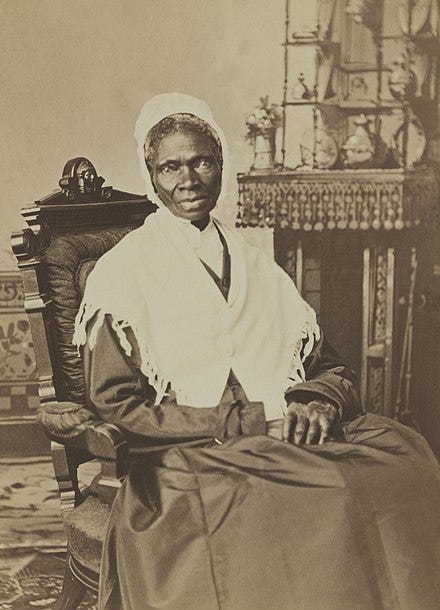Sojourner Truth, circa 1870
Issue #351: American History June 27, 2023
Sojourner Truth was a powerful advocate of human rights. Born in 1797, she overcame personal tragedy early in life and went on to become one of the most influential African-American activists of her time. She is best known for her contributions to the abolitionist movement, as well as women’s rights activism.
Born into slavery as Isabella Baumfree in 1797, she grew up in Swartekill, New York, a small rural town with a predominantly Dutch population. Her parents, James and Elizabeth Baumfree, were enslaved by Colonel Johannes Hardenbergh. James and Elizabeth had several children, but many were sold away.
As a young slave, Isabella was forced to work long hours and was also subjected to cruel punishments and harsh treatment. Despite these challenges, Isabella found solace in her faith, which would later play a significant role in her life as an activist.
During her formative years, Isabella was exposed to Dutch culture and language, as her owners spoke Dutch. She developed a strong sense of justice and empathy for others, inspired by her own experiences and the stories of other enslaved people.
As a teenager, Isabella was sold several times. In 1826, Isabella escaped from her last slaveholder, John Dumont, with her infant daughter. She found refuge with Isaac and Maria Van Wagenen, who helped her secure her freedom and provided her with the opportunity to start a new life. After going to court to recover her son in 1828, she became the first Black woman to win such a case against a white man.
In 1829, Isabella moved to New York City, where she encountered various religious movements and social reformers. It was here that she began her journey as an activist and advocate for change. She underwent a spiritual transformation and felt a sense of divine calling to fight for justice and equality. In 1843, she changed her name to Sojourner Truth, which reflected her newfound mission - to travel and spread the truth about the evils of slavery and the importance of women's rights.
“We Are Speaking,” through we publish seven days a week, is financially supported by our paid subscribers and by investments in the products and services offered by the Global Creative Community Branding and Marketing Academy. Please make sure to view and act on the important information at the end of this article to help support “We Are Speaking.” Thank you!
Throughout her life, Sojourner Truth's beliefs about women's rights, religion, and social justice were shaped by her own experiences of enslavement, abuse, and separation from her family. Her unwavering faith and commitment to justice inspired countless others to join the fight against slavery and work towards a more equitable society. Sojourner Truth's early life laid the foundation for her enduring legacy as a fearless abolitionist and women's rights activist.
She became a powerful speaker, known for her ability to captivate audiences with her eloquence and passion. Her famous "Ain't I a Woman?" speech, delivered at the Women's Rights Convention in Akron, Ohio, in 1851, highlighted the intersectionality of her experiences as both a Black woman and a former slave.
In her later years, after she learned English, she spoke English with a Dutch accent, causing misinterpretations of her dialect. The speech became widely known during the Civil War by the title "Ain't I a Woman?", although a variation of the original speech was re-written by someone else using a stereotypical slave dialect, ignoring Truth's bilingual skill of speaking English with a Dutch accent.
Truth worked closely with prominent figures of the 19th century such as William Lloyd Garrison and Susan B. Anthony to fight for justice and equality. Her efforts helped pass the 13th Amendment to the U.S. Constitution, which abolished slavery. She also campaigned tirelessly for women's rights and along with other female activists was instrumental in getting several states to grant voting rights to women.
In 1883, Sojourner Truth passed away at age 86.
A memorial bust of Truth was unveiled in 2009 in Emancipation Hall in the U.S. Capitol Visitor Center. She is the first African American woman to have a statue in the Capitol building. In 2014, Truth was included in Smithsonian magazine's list of the "100 Most Significant Americans of All Time."
Let us know your thoughts about what new information you learned in the comments or in the Substack Notes feature.
You can always leave any questions in the comments or email us.
This article is free to access for 7 days after publication. Please consider becoming a paid subscriber for $5/month or less to access all of the articles and other benefits.
This is your chance to support everything Keith and Pam do. We appreciate you!
Purchase and download your copy of the “Branding And Marketing For The Rest Of Us” eBook for Independent Authors and Creative and Solo Professionals and other valuable eBooks.
Enroll in one of the 6-course bundles designed especially for you: “Author and Book Marketing” and/or “Essential Creative Marketing.”
Purchase your copies of “Detroit Stories Quarterly” issues.
Purchase your copies of “The Mayonnaise Murders” Parts 1, 2, and 3
What else do Keith and Pam do?
Where else can you find us?
Click the link below to learn everything you need to know and review everything we offer for independent writers and creative and solo professionals.









